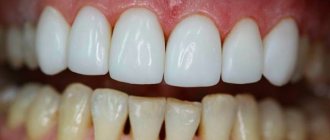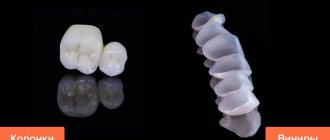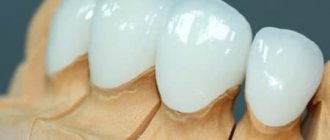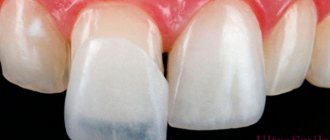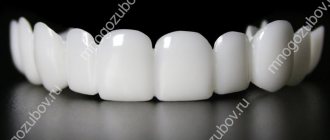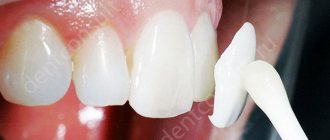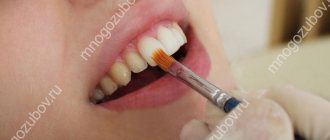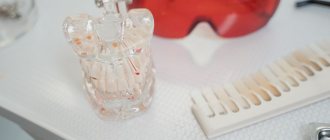Indications for installation of ultraneers
- The shape and color of the teeth do not suit the patient.
- Impossibility of bleaching.
- Fillings that have changed color.
- Incorrectly performed dental restoration.
- Interdental spaces, cracks and chips.
- High abrasion and sensitivity of teeth.
- Slight unevenness of the dentition.
Installation of ultranir can be carried out for medical reasons or simply at the request of the patient.
Operation
Medium difficulty
There are contraindications
Doctor's qualifications
High
Ultraneers - price in Moscow for 1 tooth
The cost of one ceramic onlay depends on the level of the clinic performing ultraneers and the qualifications of the doctor. On average, for a plate for 1 tooth (each ultraneer is made separately) in Moscow you will have to pay 20 - 25 thousand rubles, and ultraneers will cost you less than lumineers and, as a rule, more expensive than veneers. If the clinic offers you ceramic onlays for much less than 20 thousand rubles, this may indicate low quality of the material or insufficient experience of the specialist.
Publisher: Expert magazine about dentistry Startsmile.ru
Advantages of installing ultraneers on the front teeth
- High aesthetic qualities, the ability to choose the ideal shade.
- Perfect fit to teeth. High-precision equipment is used to produce linings.
- Ultraneers protect the enamel from dirt and adverse temperature influences, this is especially true for sensitive teeth.
- Durability due to solidity and fracture strength.
Cost of the operation
from 20,000 rub.
Recovery time
from 3 days
Operation time
from 60 to 180 minutes
What are ultranines made from? Technologies and materials
As mentioned earlier, the techniques for making ultraneers are the same as for veneers:
1. Pressing (ceramics based on lithium disilicate) : E-max ultraneers, made by pressing and sintering technology of E-max ceramics, are strong, similar in strength to natural tooth enamel. In addition, such products are distinguished by their natural transparency, and therefore are indistinguishable from one’s own teeth. Using the pressing technique, the most aesthetically perfect dental overlays are produced.
2. Layer-by-layer application of feldspathic ceramics . Veneers are also made using this method. A technician manually applies layers of ceramics to the future ultranir; the thickness of one layer is a fraction of a millimeter. This type of work is very precise and requires a lot of experience to achieve a perfect result. In a certain sense, this is not a routine, but an art.
Feldspar ultraneers are very natural; not every dentist will be able to distinguish feldspathic ultraneers from a natural tooth.
3. CAD/CAM : new technique. The bottom line is that the method of ultra-precise turning of a microprosthesis using special robotic equipment is used. Using casts, a model of the client’s jaw is made, then it is digitalized using a 3D scanner. The technician models the product in a computer program, the digital information is transferred to a milling machine, where the process of turning ultraniers from a zirconium workpiece is controlled by automation. Due to precision manufacturing, milled ultraniers are tightly fixed to the tooth surface, providing high aesthetic performance and a long service life. Such ultraneers are stronger than those made by pressing, but are inferior to the latter in terms of aesthetic indicators.
How to install ultraneers
The procedure is painless and quick – making the onlays takes no more than two weeks.
Installing onlays requires visiting the dentist twice and completing three technological steps.
- Determining the possibility of installing ultranir and assessing the scope of work. If there are no contraindications to the procedure, an impression of the dentition is made.
- Making records.
- Professional teeth cleaning to remove plaque. Fixation of ultranir with a special composition. The procedure ends with polishing the installed overlays.
When are ultraneers used?
Based on their design features, the scope of application of ultraneers is similar to that of lumineers. Installation of ultranir is recommended in the following cases:
- Slight curvature of the front teeth;
- To correct the color of tooth enamel, or teeth that are not naturally white;
- Irregularly shaped teeth (for example, teeth that are too small;
- Small diastemas or trems - spaces between teeth, on the front part;
- Darkened fillings on the front teeth;
- Increased sensitivity of enamel;
- The presence of cracks or chips in the enamel that are superficial and caused by external factors.
Ultraneers will not help in the following cases (the cases are the same as for veneers):
- Strong displacement of the jaws due to incorrect bite - the dentures will quickly crack;
- Bruxism is the contraction of the jaws during sleep. Damage to dentures is sometimes possible;
- Ultraneers will not help with orthodontic problems - they will need to be treated with braces or mouthguards;
- Increased tooth wear. Treatment of this disease requires a serious analysis of the functioning of the entire dental system; the use of ultraneers and even veneers will most likely not bring the expected result;
- Insufficient hygienic oral care;
- Chronic inflammatory processes in the oral cavity;
- Gum diseases.
Dental care after installation of ultraneers
Patients with pads must undergo regular hygiene procedures:
- Brush your teeth twice a day;
- Use thread;
- Rinse your mouth after every meal;
- Use an irrigator to clean hard-to-reach areas.
Care should be taken when biting into hard foods to avoid chipping.
Installing these overlays can be beneficial, but this should be done taking into account the recommendations of a specialist, taking into account the positive and negative aspects.
Installation steps
Fixing the onlays will require several visits to the dentist. The production time for such veneers is 1-2 weeks. Ultraneers are installed in stages:
- Examination of the patient’s oral cavity, treatment of dental and gum diseases, sanitation.
- Enamel preparation (if necessary).
- Taking impressions of teeth, installing temporary structures if grinding was carried out.
- Repeated visits to the dental clinic as soon as the ultraneeds are ready. Fixing the onlays with dental glue.
- Grinding and polishing of ultraneers for a full visual match of natural teeth.
At the end, it is necessary to check the comfort of wearing the pads. If necessary, correction is made.
Ultraneers, veneers or lumineers - which is better?
Regardless of the type of veneer, all of these aesthetic microprostheses perfectly transform the patient’s smile. There are situations where ultra-thin structures (Lumineer, Ultraneer) and classic veneers successfully cope with the same problem. Under such conditions, it is more advisable to choose an option that does not require grinding of the enamel.
However, it happens that thin plates are not suitable. For example, if a person has bright spots on the enamel and severe cracks. In this case, a transparent dental microprosthesis will not cover the cosmetic defect. For this reason, the specialist will recommend coating not with ultraneers and lumineers, but with classic veneers.
How does the installation proceed and what to do after it?
If there is caries in the area where ultraneers are installed, it must be cured, and office cleaning is always carried out to remove plaque and tartar. Then the doctor makes a cast of the patient’s jaw - from this cast, the plates themselves will be made in exact accordance with the anatomical features of a particular person. So that the patient can evaluate the result of treatment in advance, a computer model of his future smile is created - Smile design.
A few days later, when the structures are ready, they are fixed to the teeth using special dental cement. At the end of the procedure, the doctor will announce the rules that must be followed during home care: regular oral hygiene, as well as taking some precautions when eating (for example, you should not chew hard foods like nuts).
Veneers
Historically, the first artificial devices to correct such defects were veneers. Varieties are known. Ceramic veneers or those made on the basis of metal dioxides - aluminum, zirconium - are more often used. The linings are relatively thick, the figure ranges between 0.6 and 1.5 mm. The installation of veneers is considered final; it is impossible to remove them in the future, because before installation the doctor will have to grind down the tooth enamel. Without such a radical measure, the plates will seem unnaturally convex.
Hollywood veneers
Hollywood veneers , also known as LUMINEERS, are in great demand and popularity. Compared to other types of veneers, the installation process is NOT easier or more affordable. This procedure does not involve grinding the tooth surface, so healthy teeth are not subject to injury at all.
Hollywood veneers are thin layers of high-quality, durable porcelain that are attached to the surface of the teeth using a special compound. In the production of Hollywood veneers, special modern technologies are used, due to which the thickness of high-strength porcelain is no more than 0.2 millimeters.
| More photos of real work BEFORE and AFTER installation of lumineers... |
The production of such veneers is carried out exclusively in the specialized dental laboratory Cerinate (Dent Mat company, Los Angeles, USA).
With proper care, Hollywood veneers can reliably last from fifteen to twenty years. If necessary, the doctor will easily replace such veneers and you will once again conquer the world with your dazzling Hollywood smile!
The cost of Hollywood veneers (lumineers) is 30,000 rubles.
Pros and cons of ultra-thin veneers
The advantages of using such microprostheses include:
- No need for tooth preparation;
- Possibility of obtaining an enamel shade identical to natural;
- If necessary, the ability to create the perfect snow-white tone;
- Long operational period – about 10 years;
- Achieving extreme strength, which is facilitated by the use of a unique modern material IPS e.max. In addition, this material is characterized by increased resistance to staining;
- Saving financial and time costs, since ultraneers are produced in our country;
- Shortened installation period;
- No discomfort during the procedure;
- Fully compatible with natural teeth.
Negative sides:
- The cost of ultranir is significantly inflated;
- Requires careful cleaning and careful handling;
- They are not eliminated when it is necessary to eliminate complex deficiencies.
What are ultranir?
Ultraneers are an innovative achievement in the field of modern dentistry. They are ultra-thin overlays that reliably protect the surface of the teeth, and also improve their shade and shape.
The production of such plates is carried out in laboratory conditions, using IPS e.max glass ceramics. The development of this material was carried out in Germany. At the moment, it is the safest material for the human body, which, moreover, has unsurpassed strength, uniformity and a long service life. It is obtained by pressing under high pressure.
Ultranir service life
The uniqueness of the IPS e max ceramic material lies in its ability to withstand increased loads even with a small thickness of 0.3 mm. Moreover, such a metal-free plate is characterized by uniformity and the ability to maintain the original shade for 10 years or more. When done correctly, ultranir adheres tightly to the tooth surface, which guarantees long-term use and resistance to external influences. Taking into account the indicated indicators and the possibility of a professional approach, ultranir can have a service life of about 15 years .
In our dentistry, highly qualified specialists with impressive experience in the field of artistic dental restoration will work with you. They regularly take advanced training courses in the best foreign clinics and master the intricacies of working with innovative restoration materials. We also use modern equipment in our activities, which significantly improves the quality and accuracy of the procedures performed, and also guarantees a prolonged result.
Prices for services
Consultation with a dentist - orthopedist Free Installation of 1 ultranir (ultra-thin onlay) from RUB 21,990.Ultraneers are innovative ultra-thin ceramic plates with unprecedented fracture strength! Analogous to Western lumineers. No grinding of teeth (as for veneers) is required!
We produce ultraneers in our dental laboratory. Therefore, our clients can enjoy a snow-white smile with ready-made ultraneers in just 8–10 days. And the cost is 1.5–2 times less. The price will pleasantly surprise even budget-conscious customers.
Composite veneers
Composite dental veneers have recently become more and more popular. This is due to the fact that they are not as expensive as ceramic ones, and, moreover, the process of their manufacture and installation is less time-consuming. Composite veneers are made from high-quality filling material, the properties of which resemble ceramics. The advantage of this material is that the dentist has to remove a smaller layer of enamel from the patient’s teeth than when installing ceramic veneers.
An experienced doctor will manufacture and install composite veneers in just one session. With the help of such veneers, even very serious dental damage can be ideally restored. However, it should be taken into account that composite veneers , unlike ceramic ones, are less resistant to the effects of food dyes, so they need to be provided with appropriate care - this way they can serve their owner for many years, however, as a result of frequent use of a toothbrush, they lose their natural shine. In addition, they cannot be polished to the smooth enamel of natural teeth, since composite materials do not have light refractive properties.
The cost of composite brooms is 8,350 rubles.
What are veneers?
Veneers are a special coating that is applied to the surface of the teeth. They are made in the form of thin veneer plates, the main function of which is to improve the overall appearance of the teeth, as well as correct certain defects and imperfections. High-quality ceramics and special filling materials are used to make veneers.
The main indications for straightening teeth with veneers include:
- curvature of teeth;
- presence of chips;
- disproportionately large or, conversely, small teeth;
- wide spaces between teeth;
- the presence of fillings, the color of which is noticeably different from the natural color of the teeth;
- presence of stains on the tooth surface.
Indications and contraindications for use
- change in enamel color: yellow or dark teeth, especially in cases where the shade of the enamel cannot be changed with modern whitening methods;
- spaces between teeth (trema or diastema);
- old fillings;
- chips or cracks in enamel;
- protection of weak tooth enamel;
- slight change in the position of the teeth.
Contraindications to the installation of microprostheses are too weak enamel if it requires grinding (without grinding, onlays, on the contrary, protect the teeth from increased sensitivity), serious changes in the bite, teeth that are too long or too short, and severe gum disease. Also, the pads are not suitable for patients with bruxism (if you involuntarily clench your teeth too much, which leads to their grinding, the pads can simply come off due to excessive pressure).
Where to put it in Moscow?
Today this service is provided by dozens of medical centers. But by contacting us, you will receive the highest quality service: our prosthetists have more than 15 years of experience. If you are unhappy with your smile and want to improve it without resorting to aggressive methods, microprosthetics will be a good solution. All veneers installed in our center are guaranteed.
You can find out the price of ultranir by calling the clinic. If you are just choosing a method to solve some aesthetic problems with your teeth, come to us for a consultation - the initial examination and drawing up a treatment plan is free. You can make an appointment at the clinic by phone.
Advantages and benefits of veneers
One of the main advantages of high-quality dental ceramics that are currently used is its absolute biocompatibility. In addition, these materials are distinguished by high aesthetic properties; like the natural enamel of healthy teeth, they create the effect of optical translucency. Therefore, veneers are the optimal solution in the presence of chips, wide interdental gaps, uneven tooth shapes, as well as changes in the natural color of the teeth. A wide range of colors will allow you to produce veneers of any shade, depending on the wishes and preferences of the patient.
Veneers are also good because they practically do not require any special care - just clean them regularly with a regular toothbrush.
Veneers and ultraneers: microprosthetic technologies
Make a Hollywood smile your reality for RUR 15,900.
A wide, blinding smile can work wonders - it makes a person more attractive, allows its owner to quickly win over strangers and gives extraordinary charm. However, not everyone is naturally blessed with straight, white teeth of the correct shape - many are embarrassed to smile due to some aesthetic problems and feel insecure in a group. But modern dentistry does not stand still, and experienced doctors at our clinic can quickly correct any defect by placing veneers on teeth at competitive prices.
Why is it profitable for us to place veneers on teeth?
Do you naturally have insufficiently white tooth enamel, and you cannot achieve the desired whiteness with whitening? Don't like the gaps between your front teeth and have been dreaming of getting rid of them for a long time? Do you want to correct the shape of your teeth, but don't know how to do it? Then you definitely need to contact the “Good Doctor” clinic and get Hollywood veneers installed, with which your smile will become charming.
Our clinic employs only experienced dentists who have specialized education and have been working in their specialty for many years. A large dental practice, modern equipment and the latest technology allow us to achieve incredible results and ensure that each of our clients leaves with a happy smile on their face. That is why many people contact us every day who want to get veneers on their teeth in Moscow at competitive prices.
We recommend our clients to install ceramic veneers because:
- you can choose a shade of veneers that will best match the shade of your teeth;
- they do not darken or fade even after 10 years of use;
- with their help, you can solve a number of aesthetic problems (enamel pathologies, curvature of teeth, gaps between the front teeth, etc.);
- you can restore your teeth in the shortest possible time, and the prices for veneers will be even lower than the cost of treating enamel pathologies;
- They are highly durable and have the same strength as natural, healthy tooth enamel.
The cost of veneers directly depends on what type of ceramic they were made from - porcelain or zirconium dioxide. Prices for zirconia veneers are higher than for porcelain veneers because they are made using modern technology, during which the prosthesis is subjected to three-dimensional milling on a computer-controlled machine.
We offer the best prices for veneers in Moscow and in our work we use only the highest quality materials and modern technologies for manufacturing microprostheses. That's why our clients always leave us with a sparkling smile on their face!
Indications for the use of veneers and ultraneers:
- Cracks in enamel and chipped teeth;
- Stains on teeth that cannot be removed by other means (tetracycline teeth, fluorosis);
- Tremas and diastemas (gaps between teeth);
- Problems with your bite or crooked teeth;
- Enamel pathologies: increased abrasion, weakness, congenital underdevelopment;
- The desire to change the appearance of teeth, their shape or color.
Typically, veneers are installed on the front teeth, but can also be used on other teeth. However, installing veneers on chewing teeth is not recommended due to the fact that they are not designed for such high loads. If restoration of this particular group of teeth is required, it is better to use dental crowns that completely cover the surface of the tooth.
Advantages of veneers and ultra-veneers
Veneers and ultraneers have a number of advantages, in particular:
- They provide an aesthetic appearance of teeth: they allow almost everyone to achieve a perfect smile. When creating veneers, ceramic materials are used that allow you to completely copy the appearance of the patient’s natural teeth. Veneers can also be used in cases where the whitening procedure is contraindicated. Based on the color of the living teeth, the orthopedist selects the degree of transparency and the shade that are most similar to natural teeth. At the same time, veneers can be tinted by hand to achieve a more natural color;
- Long service life: veneers and ultraneers, if treated properly, will last at least 10-15 years. The prosthesis captures not only the external, but also the cutting surface of the tooth, which protects it from chipping and cracking;
- Veneers are durable and reliable: modern microprostheses, created using the right technology and installed by a qualified dentist, are as hard and durable as natural enamel. Therefore, to install veneers, you should contact trusted clinics that employ highly qualified specialists;
- Protection of natural teeth from adverse external influences: when installing microprostheses, enamel grinding is used to securely fix the veneer. It is not necessary to remove the nerve, unless, of course, there is an inflammatory process in the tooth canal. Good microprostheses do not stain or deform over time, and do not absorb dyes. Thus, a microprosthesis not only provides an attractive appearance of teeth, but also prevents the adverse effects of bacteria on living tooth tissues
- Restoring teeth in a short time: installing veneers makes it possible to correct slight crooked teeth or malocclusion without the need to wear briquettes for a long time;
- Fixation of tooth height and restoration in case of increased wear, when teeth become shorter over time: this often leads to malocclusion and aesthetic problems. The use of microprostheses allows you to completely solve this problem, and in a short time. It only takes a few visits to the dentist.
- Biocompatibility: veneers do not contain metal elements, so the risk of allergic reactions and irritation is minimized;
- Veneers can restore not only one damaged tooth, but also an entire group of teeth.
Installation of Veneers
Not everyone knows, but the use of dental veneers has a long history. At first, movie stars in Hollywood resorted to them to hide existing dental defects and look flawless on television. Today, aesthetic dentistry technologies have advanced far, so anyone can regain the beauty and strength of their teeth.
There are two types of veneers:
- Porcelain or ceramic (laminates);
- Composite.
Laminates or ceramic microprostheses are thin porcelain plates designed to replace the surface layer of tooth enamel. The thickness of the veneer usually does not exceed 0.5 mm. Microprostheses are made from solid ceramics and can be reinforced with zirconium dioxide or aluminum oxide. Reinforcements increase the strength of the veneers, but at the same time increase the thickness of the microprosthesis. Therefore, their installation requires significant grinding of the enamel.
Ceramic veneers are created in a dental laboratory using impressions. In this case, a microprosthesis can be made from various types of ceramics, the choice of which depends on the equipment of a particular dental clinic.
When creating composite microprostheses, various light-curing materials are used, which have increased strength and an attractive appearance (compared to conventional dental fillings made of composite materials). Composite veneering technology is also called artistic tooth restoration. Such microprostheses completely cover the tooth. They are created directly during the patient’s appointment, the so-called “direct method”. Based on the appearance (shade, shape) of a living tooth, the appearance of a microprosthesis is created. Artistic dental restoration is carried out by a qualified dentist. As a result, high aesthetic performance is achieved. However, composite microprostheses are somewhat inferior to their ceramic counterparts in terms of strength and durability. In addition, with composite microprosthetics, it is often necessary to resort to significant grinding of the enamel.
Methods for creating ceramic veneers
Today there are three ways to manufacture ceramic microprostheses:
- Traditional: manual method, which involves the dentist applying several layers of ceramic material. To obtain a high-quality result, a highly qualified doctor is required, as well as strict adherence to all stages of microprosthetics;
- Pressing (casting): veneers made by pressing ceramics are stronger, similar in strength to natural tooth enamel. Also, such microprostheses are distinguished by natural transparency, therefore they are practically indistinguishable from living teeth.
- CAD/CAM: the latest technology. Here, the method of ultra-precise turning of a microprosthesis using robotic equipment is used. The resulting products are fixed as tightly as possible on the tooth surface, which ensures high aesthetic performance and record durability for microprostheses.
Stages of installing veneers:
- It is necessary to prepare the supporting teeth. If inflammatory processes and carious formations are present, they must be cured. In this case, it is not necessary to install a filling on the outer surface of the enamel, since the microprosthesis must completely adhere to the surface of the tooth. Grinding is also carried out so that the veneer does not increase the size of the tooth and is fixed as tightly as possible.
- Next, an impression is taken from the prepared tooth, which is sent to a dental laboratory to create a microprosthesis.
- While the veneers are being made in the laboratory, it is possible to install temporary plastic prostheses. Temporary structures will protect the ground enamel and provide an aesthetic appearance of the teeth. In addition, temporary dentures allow the patient to see what the teeth will look like after the veneers are installed. If necessary, the dentist can adjust the shape of the temporary denture to achieve optimal functionality and an attractive smile. Porcelain veneers take about five to seven days to create.
- Ready-made microprostheses are installed in the patient’s oral cavity using a special solution that ensures strong fixation.
A few words about ultranir. Ultraneers are an analogue of ceramic veneers. They are much thinner (about 0.3 mm), so they can be installed without grinding the tooth enamel or with minimal grinding. The degree of teeth grinding depends on the individual characteristics of the patient. Modern ultraneers make it possible to achieve a high degree of strength and resistance to deformation with minimal thickness.
The technology for creating ultra-veneers and the installation process are practically no different from installing ceramic veneers. The service life of ultranir is also about 10-15 years. Veneers have one, but significant drawback - it is an irreversible procedure. If you resorted to using veneers, the enamel of the damaged tooth has already been ground down. Therefore, if the microprosthesis breaks or comes off, you will have to contact the dentist again. To date, there are no methods for restoring ground enamel. However, among all modern microprosthetic technologies, the installation of veneers is still preferable to ultraneers or lumineers due to the fact that this method allows you to achieve the highest quality result. Veneers cause fewer problems to wear, have the highest level of reliability and provide a flawless smile. It is only important to choose a competent specialist who will competently install microprostheses. Then you won't have to worry about the veneers coming off or getting damaged. They will serve you for a very long time.
Price issue
The cost of microprosthetics using veneers can vary depending on the materials used and the technology for creating the microprosthesis. So, say, veneers reinforced with aluminum oxide or zirconium dioxide will cost slightly more than just ceramic products.
However, veneers are cheaper than their analogues - lumineers and ultraneers. The most expensive are lumineers, a little cheaper than ultraneers. At the same time, the difference in quality is almost unnoticeable, but installation technologies have important differences.
Veneer care
Caring for microprostheses does not require any special procedures. It is necessary to maintain traditional oral hygiene and periodically visit the dentist’s office to monitor the condition of microprostheses. Wearing veneers does not imply prohibitions on eating solid foods. However, it is recommended to avoid biting too hard food with the teeth on which microprostheses are installed. This will significantly extend the life of the veneers.
Modern aesthetic dentistry offers effective technologies for restoring damaged teeth.
Today you no longer need to experience psychological discomfort or nutritional problems due to the fact that part of a tooth is missing. The technology for creating veneers will give your teeth an attractive appearance and prevent further destruction of the enamel. You can also install microprostheses created using other technologies. Ultraneers and lumineers are analogues of veneers and provide a high level of wearing comfort, as well as a flawless smile for many years. Sign up for a consultation
Ceramic veneers
Ceramic veneers are the thinnest plates made of high quality ceramics. They are fixed on the front surface of the teeth and completely cover it. In this case, all other sides of the teeth, except the front, remain completely intact.
Porcelain veneers are very resistant to abrasion and other damage. Compared to metal-ceramics, they are much less susceptible to chipping. Modern ceramic materials are characterized by high strength and hardness, due to which all the functional abilities of the teeth are fully preserved. In addition, veneers made from ceramics do not lose their original color at all, even if their owner often drinks coffee and tea in large quantities.
Ceramic porcelain veneers can not only significantly transform the appearance of teeth, but also reliably serve for a long time.
The cost of ceramic veneers is 16,000 rubles.
